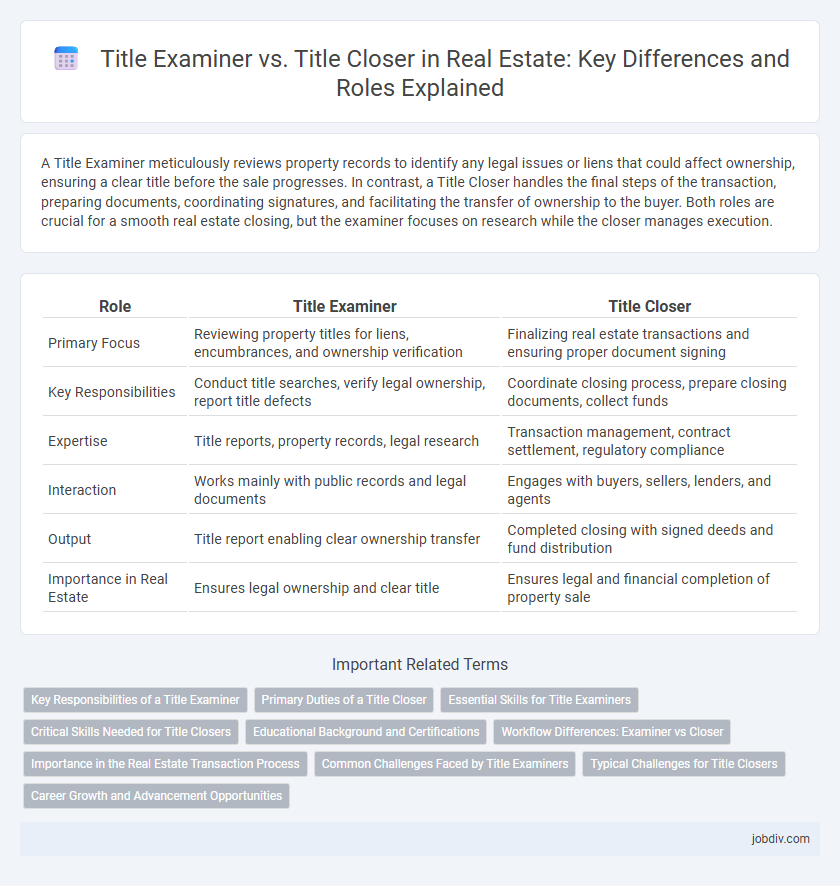A Title Examiner meticulously reviews property records to identify any legal issues or liens that could affect ownership, ensuring a clear title before the sale progresses. In contrast, a Title Closer handles the final steps of the transaction, preparing documents, coordinating signatures, and facilitating the transfer of ownership to the buyer. Both roles are crucial for a smooth real estate closing, but the examiner focuses on research while the closer manages execution.
Table of Comparison
| Role | Title Examiner | Title Closer |
|---|---|---|
| Primary Focus | Reviewing property titles for liens, encumbrances, and ownership verification | Finalizing real estate transactions and ensuring proper document signing |
| Key Responsibilities | Conduct title searches, verify legal ownership, report title defects | Coordinate closing process, prepare closing documents, collect funds |
| Expertise | Title reports, property records, legal research | Transaction management, contract settlement, regulatory compliance |
| Interaction | Works mainly with public records and legal documents | Engages with buyers, sellers, lenders, and agents |
| Output | Title report enabling clear ownership transfer | Completed closing with signed deeds and fund distribution |
| Importance in Real Estate | Ensures legal ownership and clear title | Ensures legal and financial completion of property sale |
Key Responsibilities of a Title Examiner
A Title Examiner thoroughly reviews property records, public documents, and legal liens to ensure clear ownership and identify potential title issues or discrepancies. They verify the accuracy of legal descriptions, assess title defects, and prepare detailed reports to support title insurance issuance. Their expertise is critical for preventing disputes and ensuring secure property transactions.
Primary Duties of a Title Closer
Title closers primarily manage the final stages of real estate transactions by coordinating the signing of closing documents and ensuring all parties fulfill contractual obligations. They review settlement statements, disburse funds, and record the new deed with the appropriate government office to guarantee clear ownership transfer. Title closers also resolve any last-minute issues that could delay the transaction, ensuring a smooth and legally compliant closing process.
Essential Skills for Title Examiners
Title examiners require exceptional analytical skills to meticulously review property records, identify liens, and verify ownership histories to ensure clear titles. Proficiency in legal documentation and attention to detail are crucial for detecting discrepancies or potential issues that could affect property transactions. Strong communication skills enable title examiners to collaborate effectively with attorneys, lenders, and real estate agents throughout the title examination process.
Critical Skills Needed for Title Closers
Title closers require expert knowledge in real estate contracts, escrow processes, and title insurance to ensure smooth property transactions. Strong communication skills and meticulous attention to detail are critical for verifying all documentation and resolving any discrepancies before closing. Proficiency in legal compliance and the ability to coordinate with multiple stakeholders, including lenders, agents, and buyers, are essential to successfully finalize real estate deals.
Educational Background and Certifications
Title examiners typically hold degrees in paralegal studies, real estate, or related fields, supplemented by certifications such as the American Bar Association's Paralegal Certification or National Association of Land Title Examiners (NALTE). Title closers often possess backgrounds in real estate, finance, or law, with certifications including the American Land Title Association (ALTA) Closing Certification to ensure compliance and accuracy in closing processes. Both roles require continuous education to stay updated on state-specific regulations and industry best practices.
Workflow Differences: Examiner vs Closer
The title examiner initiates the workflow by meticulously researching public records to identify any liens, encumbrances, or title defects that could affect property ownership. In contrast, the title closer finalizes the process by preparing and reviewing closing documents, facilitating the transaction signing, and ensuring the proper disbursement of funds. While the examiner focuses on risk assessment and title clearance, the closer manages the administrative and legal steps to complete the real estate transaction.
Importance in the Real Estate Transaction Process
Title examiners play a crucial role in real estate transactions by meticulously researching property records to ensure clear ownership and identify potential liens or encumbrances. Title closers finalize the transaction by coordinating the signing of documents, disbursing funds, and recording the deed to secure property ownership transfer. Both professionals are essential for a seamless and legally sound real estate closing, minimizing risks and protecting all parties involved.
Common Challenges Faced by Title Examiners
Title examiners frequently face the challenge of uncovering hidden liens, easements, or encroachments that can jeopardize clear ownership transfer. They must meticulously analyze complex public records and legal documents to ensure accuracy and prevent potential disputes. Navigating inconsistent or incomplete documentation often delays the title clearance process, demanding thorough investigation and expert knowledge.
Typical Challenges for Title Closers
Title closers often face challenges such as coordinating communication between multiple parties, ensuring all documents are accurately executed, and managing tight deadlines to prevent delays in closing. They must also address last-minute title issues or liens uncovered by title examiners that can complicate the final transaction. Navigating complex regulatory requirements and resolving discrepancies in property records are critical to successfully closing real estate deals.
Career Growth and Advancement Opportunities
Title Examiners typically focus on researching public records to verify property ownership, offering foundational experience that can lead to roles in title insurance underwriting or legal specialties within real estate. Title Closers manage finalizing real estate transactions, coordinating documents, and facilitating the closing process, which can open pathways to project management or real estate brokerage careers. Both positions provide a solid knowledge base in property law and transaction processes, essential for advancement into senior legal, compliance, or real estate development roles.
Title Examiner vs Title Closer Infographic

 jobdiv.com
jobdiv.com